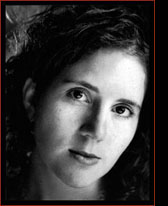The Amanda Davis Highwire Fiction Award
 I met Amanda Davis in 1999, and, as I’ve written before, she was not just a wonderful writer but a gracious, welcoming member of New York’s literary community, and her death in a tragic plane crash in 2003 was felt keenly by everyone in the publishing community who knew her. Her friends at McSweeney’s established an bi-annual $2,500 grant in her memory:
I met Amanda Davis in 1999, and, as I’ve written before, she was not just a wonderful writer but a gracious, welcoming member of New York’s literary community, and her death in a tragic plane crash in 2003 was felt keenly by everyone in the publishing community who knew her. Her friends at McSweeney’s established an bi-annual $2,500 grant in her memory:
“This memorial award is intended to aid a young woman writer of 32 years or younger who both embodies Amanda’s personal strengths—warmth, generosity, a passion for community—and who needs some time to finish a book in progress. The book in progress needn’t be thematically or stylistically close to Amanda’s work, but we would be lying if we said we weren’t looking to support another writer of Amanda’s outrageous lyricism and heart.”
Applications are now being accepted for the 2010 award. The previous winners are Shivani Manghnani, Hannah Pittard, and Jessica Anthony.
6 September 2010 | uncategorized |
On the Refinement of the Modern Book Review
I finished Freedom today, and I’ll have more to say on that later, after I’ve read Fly Away Home—for now, I wanted to touch briefly upon somethng that’s come to mind a lot as I’ve been watching the debate over the attention paid to Jonathan Franzen, and was neatly summarized in NPR’s take on it all:
“Sam Tanenhaus acknowledges that the critical establishment takes certain kinds of books more seriously than others, but he insists there are no criteria used to decide what the Times will or will not review—the goal is to find books that will engage their readers and interest their reviewers. ‘For us as editors, reviewers and critics, what we are really try[ing] to do is … identify that fiction that really will endure,’ Tanenhaus says.”
Let’s ignore, for the moment, the ways in which Tanenhaus’s own (truncated) statement about his (and his colleagues’ and peers’) goals potentially refutes the more expansive attitude ascribed to him by Lynn Neary in the sentence immediately preceding. And, yes, let’s be fully prepared to acknowledge the possibility that the Times, among other publications, has considered that the fiction of authors like Jennifer Weiner and Jodi Picoult engages quite a few readers, and that it is simply uninterested in attracting that sort of person for its own audience. I’m really most interested in the notion that “editors, reviewers and critics” have the luxury of concentrating on “fiction that will really endure,” or at least that they’d like to think will endure. I’m fascinated by that attitude because almost no other desk in the arts section gets to work that way. Can you imagine, for example, if the film reviewers felt like they had a free pass to ignore The Expendables or Eat Pray Love, or the music critics spent all their time writing about Rufus Wainwright and never had anything to say about Justin Bieber. Heck, even the Times restaurant critic occasionally takes the time to visit a restaurant not because it will “endure,” but because it’s popular. The only other department I can think of that might operate the way Tanenhaus advocates is the fine art critic… and is that really the niche in which we want to place contemporary fiction: as a collection of gallery/museum pieces?
1 September 2010 | uncategorized |

 Our Endless and Proper Work is my new book with Belt Publishing about starting (and sticking to) a productive writing practice.
Our Endless and Proper Work is my new book with Belt Publishing about starting (and sticking to) a productive writing practice. 
